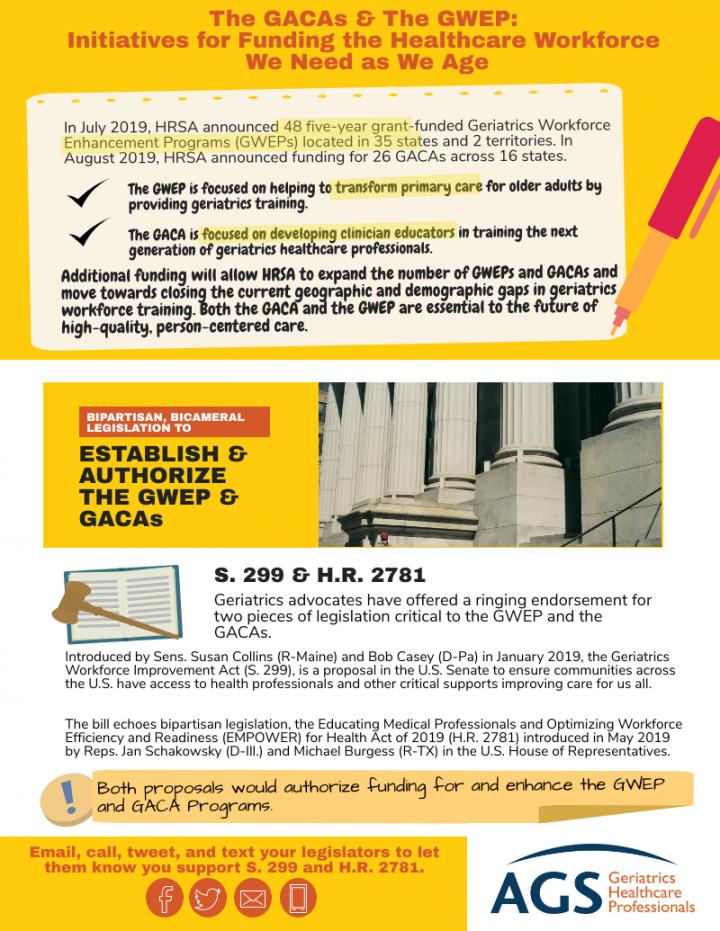
Credit: (C) 2019, American Geriatrics Society
The American Geriatrics Society (AGS) congratulates the U.S. House of Representatives, which within hours of bringing the legislation to the floor approved by voice vote the Educating Medical Professionals and Optimizing Workforce Efficiency and Readiness (EMPOWER) for Health Act of 2019 (H.R. 2781) championed by Representatives Jan Schakowsky (D-IL) and Michael Burgess (R-TX)). The bill, which received early, widespread bipartisan support as a critical measure to support health for all Americans as we age, now moves to the U.S. Senate, where AGS experts have advocated ardently for swift passage to ensure appropriate supports for older Americans.
“The future we’re working for at the AGS–a future when all older Americans have access to high-quality, person-centered care–begins by building the workforce to make that possible, and by ensuring that workforce can connect us to the tools and supports we need as we grow older together,” observed Nancy E. Lundebjerg, MPA. CEO of the AGS. “The EMPOWER for Health Act will make that possible by supporting two training programs that are as critical to our future as they are widely supported, thanks in large part to the bipartisan efforts that will make this bill law.”
Introduced earlier this year, the bill both reauthorizes and funds two important initiatives–the Geriatrics Workforce Enhancement Program (GWEP) and the Geriatrics Academic Career Awards (GACAs)–under Title VII of the Public Health Service Act, the federal mechanism for supporting health professions education and training. Both the legislation itself and the individual programs it supports draw considerable insight from the Eldercare Workforce Alliance (EWA), a collaborative comprised of more than 30 member organizations co-convened by the AGS. Like EWA, the EMPOWER for Health Act now reflects the diverse expertise of millions of health professionals who support older Americans–and understand the best path forward for sustaining that momentum.
Powered by grantees working on local solutions to workforce shortages across the U.S., for example, the GWEPs educate and engage the broader frontline workforce and family caregivers, and focus on opportunities to improve the quality of care delivered to older adults. And as a program rooted in sustaining geriatrics education, the GACAs represent an essential complement to the GWEP. By supporting time for professional development and instructional advancement, the GACAs ensure we can equip early career clinician-educators to become leaders in geriatrics training and research.
As Lundebjerg summarizes: “The GWEP provides support for the current transformation of primary care, while the GACA develops the next generation of innovators to improve care outcomes and care delivery.” “Together,” she concluded, “these platforms play a critical role in developing the workforce we all need as we age.”
Across both these efforts, the EMPOWER for Health Act would authorize funding of $51 million annually through 2024. This would allow current and future GWEP and GACA awardees to:
- Educate and engage with family caregivers by training providers who can assess and address their care needs and preferences.
- Promote interprofessional team-based care by transforming clinical training environments to integrate geriatrics and primary care delivery systems.
- Improve the quality of care delivered to older adults by providing education to families and caregivers on critical care challenges such as Alzheimer’s disease and related dementias.
- Support clinician-educators engaged in geriatrics education and research to develop the next generation of innovators to improve care outcomes and care delivery.
The EMPOWER for Health Act now moves to the Senate for consideration and a final vote before being presented to the President and becoming law. Support from constituents across the U.S. will be key to ensuring Senators move as quickly as possible to support us all as we age. To learn more about how you can contact your legislator (and what you can say about the importance of the EMPOWER for Health Act), visit http://cqrcengage.
###
About the American Geriatrics Society
Founded in 1942, the American Geriatrics Society (AGS) is a nationwide, not-for-profit society of geriatrics healthcare professionals that has–for 75 years–worked to improve the health, independence, and quality of life of older people. Its nearly 6,000 members include geriatricians, geriatric nurses, social workers, family practitioners, physician assistants, pharmacists, and internists. The Society provides leadership to healthcare professionals, policymakers, and the public by implementing and advocating for programs in patient care, research, professional and public education, and public policy. For more information, visit AmericanGeriatrics.org.
Media Contact
Daniel Trucil
[email protected]
212-308-1414
Original Source
https:/




